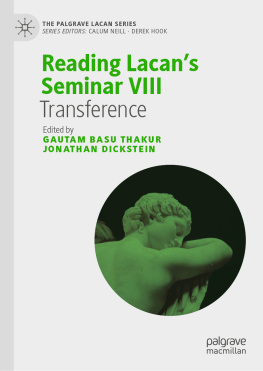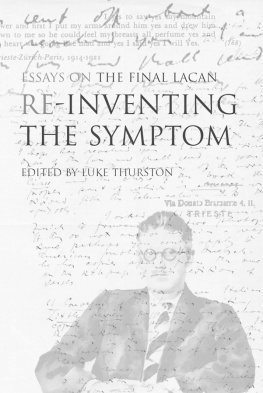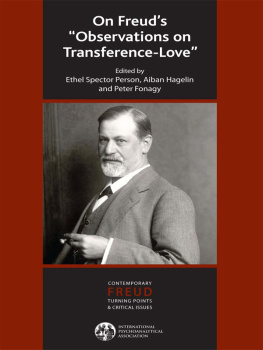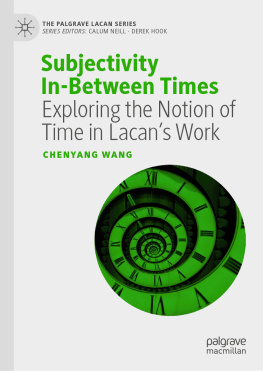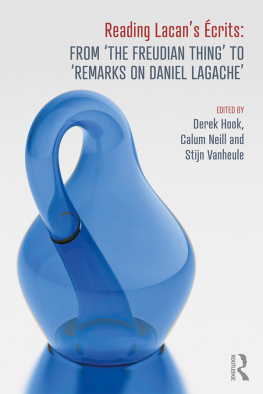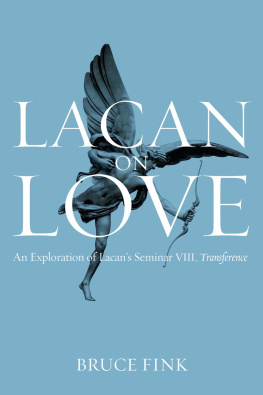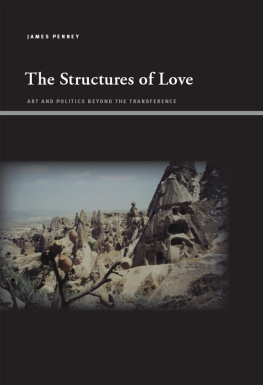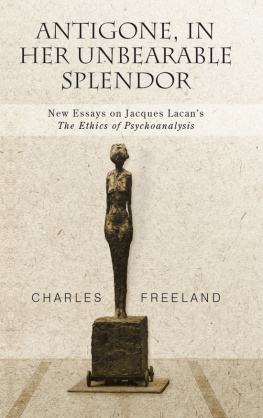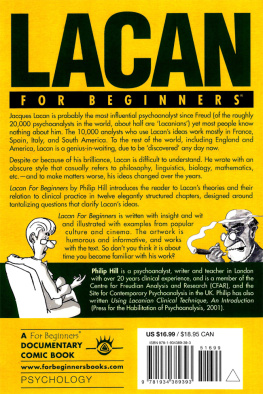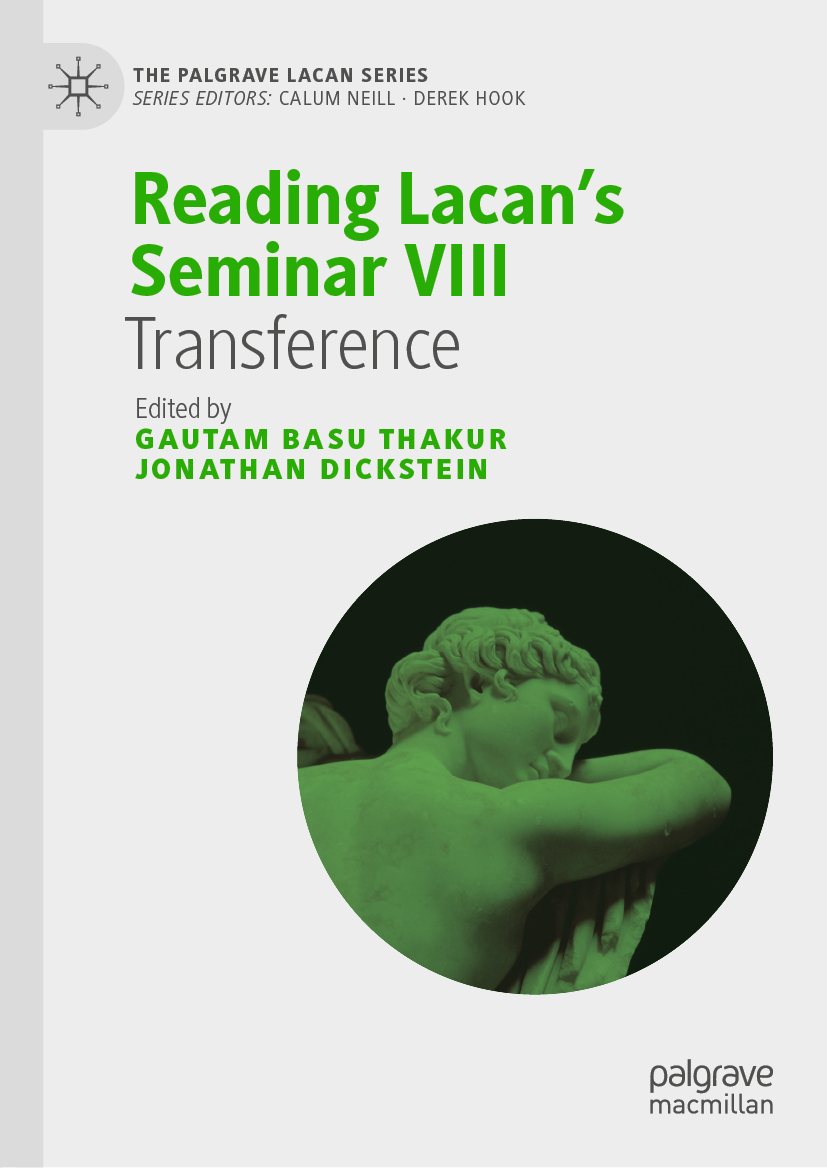The Palgrave Lacan Series
Series Editors
Calum Neill
Edinburgh Napier University, Edinburgh, UK
Derek Hook
Duquesne University, Pittsburgh, USA
Jacques Lacan is one of the most important and influential thinkers of the 20th century. The reach of this influence continues to grow as we settle into the 21st century, the resonance of Lacans thought arguably only beginning now to be properly felt, both in terms of its application to clinical matters and in its application to a range of human activities and interests. The Palgrave Lacan Series is a book series for the best new writing in the Lacanian field, giving voice to the leading writers of a new generation of Lacanian thought. The series will comprise original monographs and thematic, multi-authored collections. The books in the series will explore aspects of Lacans theory from new perspectives and with original insights. There will be books focused on particular areas of or issues in clinical work. There will be books focused on applying Lacanian theory to areas and issues beyond the clinic, to matters of society, politics, the arts and culture. Each book, whatever its particular concern, will work to expand our understanding of Lacans theory and its value in the 21st century.
More information about this series at http://www.palgrave.com/gp/series/15116
Editors
Gautam Basu Thakur and Jonathan Dickstein
Reading Lacans Seminar VIII
Transference
Editors
Gautam Basu Thakur
Boise State University, Boise, ID, USA
Jonathan Dickstein
Westfield, NJ, USA
The Palgrave Lacan Series
ISBN 978-3-030-32741-5 e-ISBN 978-3-030-32742-2
https://doi.org/10.1007/978-3-030-32742-2
The Editor(s) (if applicable) and The Author(s), under exclusive license to Springer Nature Switzerland AG 2020
This work is subject to copyright. All rights are solely and exclusively licensed by the Publisher, whether the whole or part of the material is concerned, specifically the rights of translation, reprinting, reuse of illustrations, recitation, broadcasting, reproduction on microfilms or in any other physical way, and transmission or information storage and retrieval, electronic adaptation, computer software, or by similar or dissimilar methodology now known or hereafter developed.
The use of general descriptive names, registered names, trademarks, service marks, etc. in this publication does not imply, even in the absence of a specific statement, that such names are exempt from the relevant protective laws and regulations and therefore free for general use.
The publisher, the authors and the editors are safe to assume that the advice and information in this book are believed to be true and accurate at the date of publication. Neither the publisher nor the authors or the editors give a warranty, expressed or implied, with respect to the material contained herein or for any errors or omissions that may have been made. The publisher remains neutral with regard to jurisdictional claims in published maps and institutional affiliations.
Cover illustration: DEA/ARCHIVIO J. LANGE/Contributor/gettyimages
This Palgrave Macmillan imprint is published by the registered company Springer Nature Switzerland AG
The registered company address is: Gewerbestrasse 11, 6330 Cham, Switzerland
Preface
Reading Lacans Seminar VIII: Transferenceis a collection of short commentaries on Lacans SeminarLe transfert. The seminar was delivered to training analysts at Sainte-Anne Hospital between 1960 and 1961 in twenty-seven weekly sessions.
English readers of Lacans work remained teased about transference since the publication of Seminar XI where this was featured as one of the four fundamental concepts of psychoanalysis, and the other three being unconscious, repetition, and drive.
But the significance of this particular concept, i.e., transference, extends beyond psychoanalysis and the clinic. Loosely understood as love for the subject supposed to know, transference is integral to psychoanalysis as theory and praxis: The concept directs the way in which patients are treated. And it is conversely the way in which analysands are treated that ultimately governs the concept.The curiosity about a full seminar devoted to the topic was therefore high among readers both affiliated to and beyond the clinic, including those in the disciplines of literature, film, cultural studies, and philosophy. This is because love is at the core of our most common cultural experiences and representations.
Most English readers picked up bits and pieces of this fundamental concept from thecrits, other translated pieces, and secondary scholarship, but nothing quite matched the anticipation for an actual English translation of the seminar. Consequently, the publication of Bruce Finks English translation of the seminarTransference: The Seminar of Jacques Lacan Book VIII(2015) was greeted with enthusiastic responses, including the formation of an online reading group by Derek Hook and Calum Neill. The initial push for this book comes from this group and its members who all wanted to see their thoughts and ideas about the seminar represented in a peer-reviewed format. That said while many of the commentaries in this book indeed derive from the notes produced by the members of the group, this book also contains an equal number of new contributions from a larger Lacanian community spread across the world.
Written by clinicians as well as scholars working in fields as seemingly disparate as philosophy, literature, culture studies, and computer science, the commentaries in this book represent a wide range of disciplinary perspectives on and approaches to the concept of transference. Generally, these commentaries range from 2000 words to 6000 words. Some focus exclusively on one session and others on thematic concerns across multiple sessions. For this reason, the book cannot be identified as a collection of essays in the strict sense of the term.
Neither though is it a compendium to Lacans seminar. Though many of the commentaries focus on explicating the main points of one or more sessions, the main aim of this book is to capture through shorter contributions, a spectrum of diverse voices debating, deliberating, and learning with Lacan the concept of transference and expanding the theoretical and philosophical consequences of this concept in the contexts of clinic, the classroom, and contemporary global society. These voices do not seek to establish any authoritative reading of the seminar nor are they homogenous in their understanding and interpretation of Lacan.
The incentive for the editors in curating these commentariesworking-thoughts, responses, and spandrelshas been actually threefold. Firstly, to collect different disciplinary perspectives on Lacans transference insofar as this concept interests not only Lacanian analysts but also members of the larger academic community. Secondly, it has been our hope that this book will capture diverse, even contradictory readings of Lacans seminar and thus offer in process different ways of thinking about love. Relatedly, and third, this project attempts to inaugurate a new paradigm in academic publishing by bringing out a collection of shorter writings that capture the developing thoughts of writers committed to reading Lacan with minimal reference to secondary criticism.

